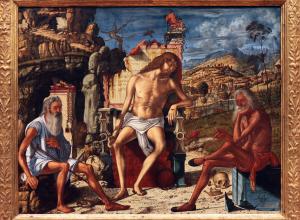
By nature, if we are to use such a term for God, God is perfect. In accordance to that perfection, God is incapable of suffering. If God suffered, then, with such suffering, there would be something less than perfect about God. This is why there is nothing we can do to make God suffer. Indeed, God is eternal and in that eternity, unchangeable, and since God is by nature perfect and without suffering, there can be no change which would produce such suffering in God. Similarly, God is the source and foundation of all that is good, and in this way, as goodness is an eternal activity or uncreated energy of God, God can be said to be the Good. As suffering is evil, and God is the Good, there is no way God can suffer, for what God is, is good, and so suffering, if it were a part of God, would be good.
These, and other arguments, are used to explain why God is said not to suffer; in relation to the divine nature, these arguments point us towards to the truth. And yet, paradoxically, God is love, and in that love, God is not an absolute monad, but tri-personal. Each divine person represents that love to each other but also work together to establish a creation which they can and do love personally and collectively. Through their mutual and collective love for creation, each divine person, in their own way, looks to creation with compassion, sees what is happening in it, observes the suffering which has been brought to it because of sin, and seeks to restore the world back to its original integrity, one which is free from suffering. “You have heard of the steadfastness of Job, and you have seen the purpose of the Lord, how the Lord is compassionate and merciful” as James said (Jas. 5:11b RSV). But, as the word compassion means “to suffer together,” to talk about God’s compassion suggests there is a way which God “suffers with” those who are suffering, and in that regard, experiences suffering in and through them. This leads us to conclude there is a sense in which God can be said to suffer:
God is generous in His loving activities. He wishes to communicate Himself to mankind, to each of us, by his self-emptying love – a self-gift that moves to communion with His human creatures. But precisely because He is so immediately present and immanently inside each person, each creature, God can also “suffer.” He must also run the awesome risk of giving love and being rejected, at least by angels and human beings.[1]
We have come to a paradox where we conclude both God does not suffer, and yet, God can and will suffer with (and in) us. How is this possible? Recognizing this is a mystery which transcends our comprehension, we can leave it at that, however, we do not have to. We can seek to have a better understanding even as we accept that we will never be able to comprehend God. In doing so, we will find ourselves coming to apprehend more and more of the truth, and thorough such apprehensions, come to realize these antinomies deal with two different aspects of God. God is incapable of suffering because the divine nature is perfect and unchanging, but God is not just the divine nature, God is tri-personal, with each person interacting with each other and creation. It is in and through the divine persons God’s love is revealed, and so, in and through them we find God’s compassion being expressed. While, by nature, God can also be said to be love, the realization of that love is personal, and so, it is possible to consider God’s experience of suffering is personal, and not according to nature. If we look at it this way, we find the perfection and impassibility of the divine nature remains intact.
Through love, through the personal interactions with each other, and creation, we can perceive a pathos in God, a pathos which allows God to be compassionate and “pained” when creation suffers, especially when innocents are made to unjustly suffer at the hands of those who have power and authority in the world. This pathos is what motivated many of the prophets as they spoke out against social injustice, but it is also what is revealed to us in the incarnation.The God-man, Jesus, showed us this compassion, this love, this pathos in the way he showed love to those who were being mistreated, but also in the way he reacted to the death of his friend, Lazarus. Such suffering was personal, coming in and through the Logos’s human nature, but because the human nature is not other than the human nature of the divine Logos, God is shown to suffer in and through the suffering of the incarnate God-man (similar to the way God is born through the Virgin Mary).
In the incarnation, we find confirmation of what was indicated by the prophets: God has a pathos, a divine energy which comes from God’s divine nature and yet is distinct from it, so God in and through that pathos has compassion with creation, a compassion which allows God to suffer in and through creation. And in Jesus, the God-man, that pathos is united with creation itself. And, as James Cone explained, Jesus’s resurrection shows that God’s compassion, God’s pathos, is especially geared towards all who suffer injustice, seeking to help them, to lift them up, while also having those who have created such unjust suffering make restitution for what they have done:
The resurrection is God’s conquest of oppression and injustice, disclosing that the divine freedom revealed in Israel’s history is now available to all. The cross represents the particularity of divine suffering in Israel’s place. The resurrection is the universality of divine freedom for all who “labor and are heavy laden.” It is the actualization in history of Jesus’ eschatological vision that the last shall be first and the first last. The resurrection means that God’s identity with the poor in Jesus is not limited to the particularity of his Jewishness but is applicable to all who fight on behalf of the liberation of humanity in this world. And the Risen Lord’s identification with the suffering poor today is just as real as was his presence with the outcasts in first-century Palestine. His presence with the poor today is not docetic; but like yesterday, today also he takes the pain of the poor upon himself and bears it for them.[2]
Suffering is an evil, but through compassion, those who willingly share in the suffering of others to help relieve them of such suffering, shows us that sometimes suffering can be transformed into a good, not because suffering is good, but because nothing is entirely evil, and the good contained in some evil act can be used to establish some greater good:
It is one of the mysteries of pain that it is, for the sufferer, an opportunity for good, a path of ascent however hard. But it remains an ‘evil’, and it must dismay any conscience to have caused it carelessly, or in excess, let alone wilfully.[3]
While suffering can be transformed and used for the good, we should always realize suffering is an evil which should never be desired. Suffering does not exist in the divine nature, in the absolute Good of God, because it is an evil. However, because the persons of God love us, each of them can, in their own way, embrace us in our suffering, and we can apprehend this in the way each of them relate to us in and through the incarnation and the God-man’s suffering on the cross:
And in the incarnation we find the co-participation of all three hypostases, each in its own manner: The Father sends the Son, and this sending is an act of fatherly sacrificial love, the kenosis of the Father, who condemns to the cross the beloved Son, who takes on himself this feat on the cross. The feast of the Son is also the self-denying love of the Father who, in “sending” the Son, condemns his very Self to co-suffering and co-crucifixion, though in a manner different than the Son. Because there is the God-man’s passion on the cross, there is also the fatherly passion on the cross, the passion of co-suffering love, of fatherly self-crucifixion. We must understand the “sending” of the Son by the Father not as an act of authority, as a command, but rather as an act of agreement, initiative, origination, all of which are hypostatically proper to the Father. [4]
Each person of the Trinity share with us our suffering, each in their own unique way. In their compassion, they take on our suffering and transform it, so that through it, some greater good can be established as the evil of suffering is brought to an end. Understanding this should help us take on the paradox of suffering and its relationship with God, to see there is a way for God to be free from suffering while still taking it on and experiencing suffering through compassionate love. Such compassion does not undermine the divine nature and its impassibility, but rather, shows us its transcendent perfection. When we understand the truth of this, we will also be able to better understand the distinction between the divine nature and God’s uncreated energies, as well as the difference between the persons of the Trinity. For it is only as an absolute monad without even relative distinctions that we find it impossible to perceive of a way to move beyond the paradox and accept both that God cannot suffer and yet, God, in God’s omnipotent love, can and does suffer with us.
[1] George Maloney, SJ, God’s Exploding Love (New York: Alba House. 1987), 118.
[2] James H. Cone, God Of The Oppressed (New York: Seabury Press 1975), 135.
[3] J.R.R. Tolkien, The Letters of J.R.R. Tolkien. Revised and Expanded Edition. Ed. Humphrey Carpenter and Christopher Tolkien (Broadway, NY: William Morrow, 2023), 180 [Letter 113 to C.S. Lewis].
[4] Sergius Bulgakov, “The Sophiology of Death ” in The Sophiology of Death. Essays on Eschatology: Personal, Political, Universal. Trans. Roberto J. De La Noval (Eugene, OR: Cascade Books, 2021), 125.
Stay in touch! Like A Little Bit of Nothing on Facebook.
If you liked what you read, please consider sharing it with your friends and family!
N.B.: While I read comments to moderate them, I rarely respond to them. If I don’t respond to your comment directly, don’t assume I am unthankful for it. I appreciate it. But I want readers to feel free to ask questions, and hopefully, dialogue with each other. I have shared what I wanted to say, though some responses will get a brief reply by me, or, if I find it interesting and something I can engage fully, as the foundation for another post. I have had many posts inspired or improved upon thanks to my readers.












